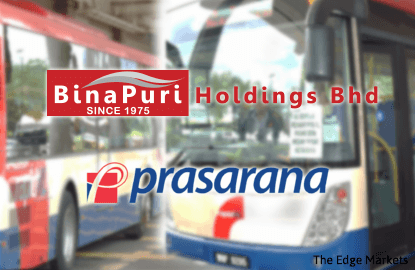
This article first appeared in Corporate, The Edge Malaysia Weekly, on May 2 - 8, 2016.
BINA Puri Holdings Bhd, in partnership with Prasarana Malaysia Bhd (formerly known as Syarikat Prasarana Negara Bhd), is likely to win the RM1 billion contract to build the bus rapid transit (BRT) system in Kota Kinabalu, sources say.
It is understood that the two partners have more or less obtained the green light from Sabah for the BRT in its capital city and are now awaiting the thumbs-up from the federal government.
“Talks between the two parties — Bina Puri-Prasarana and the state — have more or less sorted it out; it’s the federal approval that is pending, but even that seems likely to be secured,” a source says.
Officials and executives of both Prasarana and Bina Puri were not available for comment.
While the details, such as the breakdown of the equity ownership of the companies, are not known, the source says Prasarana is funding the BRT project, indicating that it may have a controlling stake in the joint-venture company.
The plan for a BRT system in Kota Kinabalu was first mooted by Prime Minister Datuk Seri Najib Razak in Budget 2016 in October last year and a sum of RM1 billion was allocated for the initiative. But there was little news about it after the announcement.
Reports, however, quote Sabah Chief Minister Datuk Seri Musa Aman as saying the system will be completed by 2020 and that it is an initiative under the Kota Kinabalu Public Transport Enhancement blueprint.
In a nutshell, BRT involves an intelligent transport system, automated fare collection, fleet tracking and closed circuit television system, among others. News reports say the buses will be battery-operated and eco-friendly while their dedicated lanes will slash travelling time.
Sabah is building four integrated bus terminals, namely the Southern Kepayan Integrated Bus Terminal near the Kota Kinabalu International Airport; the Northern Inanam Integrated Bus Terminal; the Eastern Penampang Integrated Bus Terminal; and the Wawasan Kota Kinabalu Main Terminal, the construction of which has already commenced.
The Kota Kinabalu BRT will ply between the four terminals via three main routes: a 20km stretch linking Putatan to Kota Kinabalu and onwards to Inanam; an 11km route linking Kota Kinabalu to Penampang; and a 13km route connecting Kota Kinabalu to Alam Mesra.
Bina Puri is no stranger to Sabah, having bagged the construction of Phase 2 of the RM470.3 million KK Times Square in Kota Kinabalu, the RM388.73 million Sabah Administration Centre in Teluk Likas, Kota Kinabalu, the RM123.3 million contract to build the Sabah Administration Centre in Teluk Likas, Kota Kinabalu, and the RM96.6 million KOUMS Students Hostel, also in Kota Kinabalu.
Bina Puri has also built several key roads in Sabah, such as the RM314.5 million Kota Kinabalu-Sulaman Coastal Road and the RM289 million roadworks stretching from Nangoh to Kanibungan to Jalan Nangoh-Paitan, Pitas.
Earlier this year, Bina Puri executive director Matthew Tee said he was confident of securing RM1 billion worth of construction projects this year. The BRT job could very well be a chunk of it.
This contract could also add to Bina Puri’s existing order book of RM1.89 billion and impact the company’s bottom line. Bina Puri’s margins have been razor-thin, to say the least.
As at Dec 31, 2015 (FY2015), Bina Puri posted a net profit of RM3.3 million on revenue of RM1.27 billion. In the previous year, it recorded a net profit of RM6.47 million on revenue of RM1.05 billion. Thus, net profit in the year just ended was 51.38% lower than in 2014 despite revenue gaining 20.95%.
Last Friday, Bina Puri ended trading at 40.5 sen, giving it a market capitalisation of RM94.3 million.
About 15% of the company is controlled by the Tee family whose patriarch is Tan Sri Tee Hock Seng.
Prasarana, meanwhile, is wholly owned by the Minister of Finance Inc with the Federal Lands Commissioner holding a single share in it.
As at Dec 31, 2015, the company had cash and bank balances of RM82.43 million while on the other side of the balance sheet, it had short-term borrowings of RM399.21 million and long-term loans of RM241.61 million.
In FY2014, Prasarana had suffered an after-tax loss of RM885.6 million on revenue of RM490.23 million. Its non-current assets stood at RM16.19 billion and its current assets at RM636.82 million while on the other side of the balance sheet, there were long-term debt commitments of RM13.61 billion and short-term borrowings of RM1.34 billion.
Save by subscribing to us for your print and/or digital copy.
P/S: The Edge is also available on Apple's AppStore and Androids' Google Play.